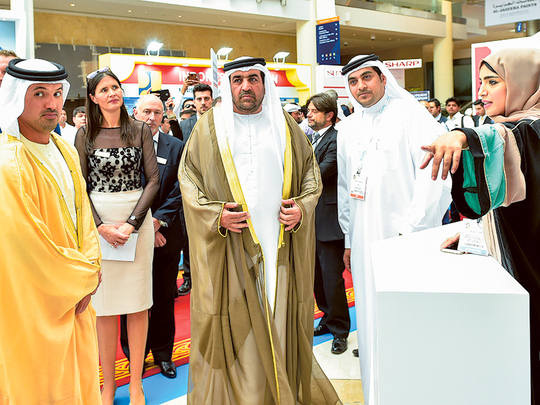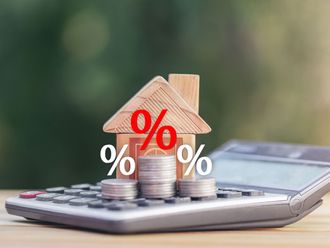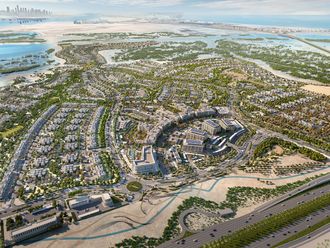
Dubai: The UAE’s construction sector may have to sit out a few more months before the Expo 2020 project build-up starts to make its presence felt.
“We are likely to see a fairly flat construction market at the beginning of 2016 — but this should pick up later in the year as specific projects come off the drawing board and filter into the construction supply chain in Dubai,” said Christopher Seymour, Head of Middle East Markets at Arcadis, the project management consultancy. “This is also likely to be felt in Abu Dhabi as redirection of funding begins to get commitments.
“Overall, our insight tells us that contractors are not as busy as they were expecting to be this time last year, although volumes remain at what we would call acceptable levels.”
These sentiments assume significance as the construction industry showpiece event, Big 5, opened in Dubai on Monday.
In the year to date, available data suggest that the value of contracts awarded are only half of what they were in the corresponding period last year. This is so despite some notable projects getting cleared, such as Nakheel’s Dh819 million award for its prestigious Palm Tower development on the island. Also in October, Nakheel revealed the scope of a Dh2.3 billion contract to develop its expanding retail portfolio, including the Night Souq and Boardwalk at Deira Islands (valued at Dh1.17 billion). But these have been the exceptions as most developers seem to be taking their time to get started on the ground works.
“New projects are now under far more scrutiny as capital values soften,” said Seymour. “The residential market has picked up most media attention, but other sectors, including hospitality and retail, are now also seeing some downward pressure. Some slowdown in awarded work was always forecast.”
More reason why everyone is waiting on the government and government-related entities to come out with all the resources at their command from next year onwards. That much needs to built between now and when the Expo 2020 opens is what gives the industry a lot of solace in the interim, and why they are willing to grit it out as payment terms stretch well beyond 120 days and when project promoters unilaterally renegotiate the pricing on the original contracts. At the subcontractor level, businesses are getting caught out by lack of cash flow and higher inventory.
In Abu Dhabi, there are different factors at work. “The low oil price has bitten hardest, yet the forecasts investment is only just below current levels,” said Seymour. “These two aspects indicate that funding is being redirected to imperatives such as oil production, essential infrastructure and security as opposed to being cut completely. We are likely to see some of the development projects slowing down with some increase in other sectors.”
Thankfully for the construction sector, building commodity prices continue to be on the softer side, helped in large part by global circumstances with China importing significantly less than has been the norm. There is also the dollar factor.
“Building material prices have drifted lower along with all the other commodities that adjusted downwards following the rally in the dollar,” said Sameer Lakhani, managing director at Global Capital Partners. “Depending on the material, thus far prices have softened by about 5-15 per cent, although this is expected to fall further as prices continue to adjust.
“Currently, there is a surplus capacity on cement as far as the region is concerned, though with the pipeline of projects announced, this is likely to swing towards a deficit. What is critical is the timeline these projects are executed.
“Given the rationalisation in project spending, there will likely be a delay in the implementation of some of these which will, in turn. impact on the level of imports. The quality of cement is also a factor here, and often there is an import need due to varying qualities required.”
For steel demand, market sources are forecasting an “additional 10 per cent on annual basis from 2017” from the current average of 5-15 per cent a year. “With the existing developments for Expo 2020 and Vision 2021, this anticipates a growth in the industry by 30 per cent until the end of this decade,” said Bharat Bhatia, CEO of Conares, the steelmaker which is funding a Dh200 million expansion at its Jebel Ali plant on top of the existing Dh900 million capital investment. The intention is to produce 1 million tonnes annually once the expansion is done.
The projected construction industry growth “will help local steel manufacturers cater the odd 3 to 4 million metric tonnes rebar demands for all these projects”, Bhatia added.
“The main factor that influences the price and demand in the UAE is inventory. If traders stock more, then selling prices come under pressure. If traders only consider buying from local producers, they will be able to maintain prices.”
Clearly, for the local construction sector and its players, it’s about getting their pacing right for the stretch leading up to the mega projects for the Expo as well as those not connected directly with it. A bit of hunkering down for the moment may be the best option.











